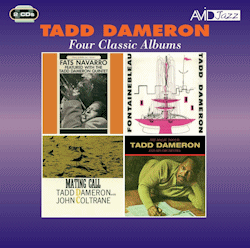Fats Navarro Featured with the Tadd Dameron Quintet
Anthropology
Lady Be Good
The Squirrel
Our Delight
Good Bait
Tadd Walk
Dameronia
Tadd Dameron and his Orchestra - Fontainebleau
Fontainebleau
Delerium
The Scene is Clean
Flossie Lou
Bula-Beige
Tadd Dameron with John Coltrane – Mating Call
Mating Call
Gnid
Soultrane
On a Misty Night
Romas
Super Jet
Tadd Dameron and his Orchestra – Magic Touch
On a Misty Night
Fontainebleau
If You Could See Me Now
Our Delight
Dial B for Beauty
Look, Stop and Listen
Bevan's Birthday
You're a Joy
Swift as the Wind
Fats Navarro Featured with the Tadd Dameron Quintet
: Fats Navarro (trumpet): Rudy Williams (alto sax): Allan Eager (tenor sax): Tadd Dameron (piano): Curly Russell (bass): Kenny Clarke (drums) recorded 1948
Tadd Dameron and his Orchestra – Fontainebleau:
Kenny Dorham (trumpet): Sahib Shihab (alto sax): Joe Alexander (tenor sax): Cecil Payne (baritone sax): Henry Coker (trombone): Tadd Dameron (piano): John
Simmons (bass): Shadow Wilson (drums) recorded March 1956
Tadd Dameron with John Coltrane – Mating Call –
John Coltrane (tenor sax): Tadd Dameron (piano): John Simmons (bass): Philly Joe Jones (drums), recorded November 1956
Tadd Dameron and his Orchestra – Magic Touch –
Blue Mitchell, Clark Terry, Joe Wilder, (trumpets): Britt Woodman, Jimmy Cleveland (trombones): Julius Watkins (French horn): Jerry Dodgion, Leo Wright
(alto sax): Johnny Griffin (tenor sax): Jerome Richardson (tenor sax, flute): Tate Houston (baritone sax): Bill Evans (piano): Ron Carter, George Duvivier
(bass): Barbara Winfield (vocals): Tadd Dameron (arranger, conductor, composer), recorded 1962
AVID JAZZ AMSC 1175
[61:10 + 71:49]
The four albums here were recorded between 1948 and 1962. The earliest is Fats Navarro featured with the Tadd Dameron Quintet. Five of the tunes
are Dameron’s and the live recordings, made in the summer and autumn of the year, produced some vintage results. Aside from the two featured musicians
Allan Eager, an audible disciple of Lester Young, acquits himself very well. Critics have tended to write off, or write down, alto player Rudy Williams,
who had been a real force in the 1930s. But I find him standing his own stylistic ground well and producing sparkling, inventive solos even if he was not a
natural bop player, being versed largely in swing. Every track has something to admire – from the epochal, cooking Dameronia to the taut solos on
the Basie-Dameron Good bait.
Fontainebleau
was recorded in Rudy van Gelder’s studio in March 1956 with a five-man front-line of Kenny Dorham, Sahib Shihab, Joe Alexander, Cecil Payne and Henry Coker
and rhythm of Dameron, John Simmons and Shadow Wilson. The original reprinted notes state that eminent conductor Sir Thomas Beecham had just recorded the
work but it had yet to be released. Possibly this was a Dameronian joke. Maybe he meant Delius’ Paris? In any case Dameron utilises a
stripped-and-laid–back Basie style here, notably on The Scene is Clean whilst ex-Basieite Coker takes an amiable trombone solo on Flossie Lou. Bula-Beige is a long blow principally for the saxes. Dorham is heard at his sparkling best on Delerium (spelt
thus).
Later in the year Dameron was back in van Gelder’s studio with John Simmons and Philly Joe Jones, in a summit meeting with John Coltrane called Mating Call. The title track sees Coltrane wailing repetitious exoticisms but Gnid is a taut swinger and encourages a more focused
approach, complete with excellent trades. Soultrane is resplendent and Coltrane is at something like his very best here – formidable and musically
seductive. Dameron plays a laid-back blues intro to Romas and Philly Joe takes centre-stage in Super Jet.
Magic Touch
dates from 1962. A biggish ensemble plays the ten Dameron originals – including another, this time more concise version of the ‘title track’ Fontainebleau. The personnel listings are not quite accurate as they omit trumpeter Charlie Shavers, who takes a striking solo on this number. But
all the solos are top-notch, from Johnny Griffin on On A Misty Night to Jimmy Cleveland’s trombone work on the light-hearted swinger Just Plain Talkin’ to the Joe Wilder vehicle, Dial B for Beauty, originally recorded by Clifford Brown a decade before. The
only thing to mark down this particular album is Philly Joe Jones’s drum solos: the one on Look, Stop and Listen is truly excruciating.
As a pianist Dameron remained a rather small-beer Basie emulator; he was more decorative than distinctive. But his forte was as one of the supreme
laureates of Bop composition and the best tracks here show how much varied material, subtly voiced and strongly soloed, he can pack in a 4 to 5
minute package.
Jonathan Woolf
